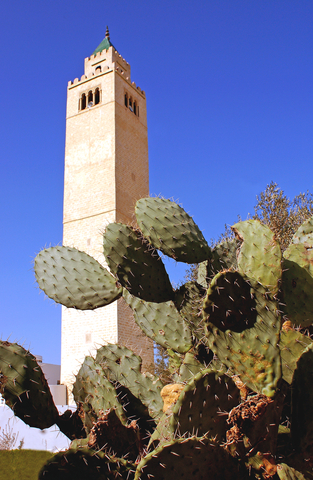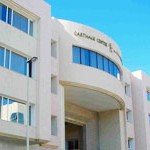
[Updated Oct 2020] A guide to serviced offices and office space for rent in Tunis as well as general information that may be useful if you are thinking of renting offices in Tunis.
For further offices information or to search office space for rent in Tunis just click. Or contact us for any other office space query.
History & Geography
Tunisia’s largest city and capital lies on the Mediterranean Sea just behind the Lake of Tunis and La Goulette Port. Tunis occupies most of the coastal plain and the slow hills which ring it. Just north of Tunis are the ruins of the ancient city of Carthage, destroyed by the Romans in 146 BCE along with Tunis itself. The Romans rebuilt the town however and transformed it into an important trading hub and the centre of a thriving agricultural industry. In the 7th century CE, the town fell under the control of the Arab Muslims who transformed the town into an important naval base. Tunis grew to become a city and towards the end of the 12th century began to dominate the entire region surrounding it. Under the Hafsid dynasty, the city grew and walls were erected for its defence. During the 16th century, the city was under the control of the Ottoman Empire, though still retained much of its independence. Over the next few centuries, Tunis was at the centre of the long-running armed conflict between the Ottoman Empire and Spain, along with several other southern European countries. In the late 19th century Tunis was occupied by the French and saw many European immigrants settle in the city. Tunis’ infrastructure was developed with street lighting, gas, waste collection, sewage works and running water all being installed. The city spread out rapidly beyond its walls and divided into a new and old city, with the former occupied mainly by Europeans. During WWII Tunis was used as a major base in North Africa by Axis forces. After Tunisia gained independence in 1956 Tunis was declared as the capital and continued its transformation into a modern city. The European population of Tunis decreased and many new districts were built around the city to deal with the increasing population.
Economy
The bulwarks of Tunis’ economy are textiles, olive oil and carpets, though the economy is currently diversifying into other areas, such as the service industries. The city is home to one-third of Tunisian companies and is the only metropolitan sized city in the country. Thus it is the heart of Tunis’ industry and the economic hub of the region. Currently, unemployment in the city is fairly high, especially among young people. The unemployment rate of those who have been to university continues to climb and there is still a high illiteracy rate among the elder population. Agriculture, particularly wine and olive oil is a thriving industry in the city, with many suburbs and industrial areas set aside for it. The two major rivers in the region, the Medjerda and the Milian mean that the area has very fertile soil and the flat terrain also makes it ideal for agriculture. Tunis is also the home of Tunisia’s financial services sector and 65 percent of the financial companies in the country have their headquarters in the city. Tourism also plays a significant role in the economy of the city, though the recent political unrest has had a negative impact.
Tourism & Culture
Tunis has always enjoyed a thriving tourism industry which is starting to pick up again now that relative calm has returned to the country in the wake of the Arab Spring. The city is known for its stunning architecture, especially Medina, which is a UNESCO World Heritage Site, containing over 700 monuments such as mausoleums, mosques and palaces. Among Tunis’ most beautiful buildings is the Court of Dar Ben Abdallah, the Court of Dar Soulaimania, and the majestic Zitouna Mosque. Dar-al-Bey is Tunis’ most famous palace and incorporates many different architectural styles and periods. The most famous museum in the city is the Bardo Museum, which started life as a Hafsid palace built in the 13th century. Today it contains one of the largest collections in the world of antiquities from Rome, Ancient Greece and other periods. Of course, the ruins of Carthage are among Tunis’ top attractions and are located only several miles to the northeast of the city. Several festivals are held in Tunis every year, the most famous being the Festival of Carthage, which is held in an old amphitheatre among the Carthaginian ruins and features dancing, singing and acting. Every year thousands of visitors flock to the festival.
The city is served by the Tunis-Carthage International Airport approximately five miles northeast of downtown, which deals with almost five million passengers a year. Tunis itself has an extensive public transport system. There are over 200 bus routes as well as a light rail system which has been in place since 1985 and reaches all areas of the city as well as the most outlying suburbs. All public transportation in the city falls under the auspices of the Societe des Transports de Tunis. A new rapid transit rail line has been planned for the city mainly directed at commuters coming from suburbs to work downtown.

Office space to rent in Tunis
The office space market in Tunis has been heavily affected by the recent political unrest in the city and surrounding region. All activity has been put on hold while companies wait to see what approach the country’s new Islamist government will take regarding foreign investment in the country. This being the case expansion plans by foreign companies have been put on hold, though the blue chips already present in the area, such as IBM and Fidelity will continue their operations. Before the recent events, Tunis was on its way to developing an office market of international quality. In the Lac de Tunis area of the city, being developed as the new prime business district, new office space is underway. Prime office rents in the city currently remain at TND 18 per square metre per month.
Our office space search, advisory and acquisition services are FREE, always. Our Tunis office space brokers and agents are globally regulated by the Royal Institution of Chartered Surveyors (RICS) ensuring the highest standards of commercial property advice and service at all times.

The Office Providers is Regulated by the RICS